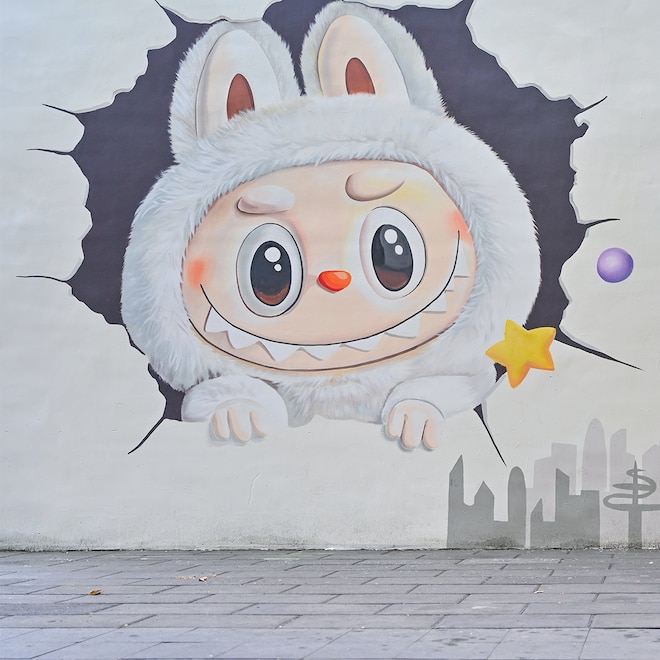Labubu, the quirky toy sensation, is not just a collector’s item but a financial juggernaut, propelling Pop Mart’s CEO Wang Ning to astronomical wealth. As of the latest Forbes estimate, Ning’s net worth has soared to a staggering $22.1 billion, a significant leap from $1.8 billion at the close of 2024. This remarkable growth is largely credited to the skyrocketing sales of Labubu, a toy that has captivated the imaginations of both children and adults worldwide.
Introduced in 2015 within artist Kasing Lung’s “The Monsters” book, Labubu made its retail debut under Pop Mart in 2023. The toy’s popularity surged when global superstar Lisa of Blackpink confessed her affection for the nine-toothed, furry creature, describing her quest to find Labubu as a “treasure hunt” during a 2024 Vanity Fair interview. This celebrity endorsement, coupled with the allure of the “Blind Box” packaging, has fueled a cultural phenomenon.
The Labubu Phenomenon and Celebrity Endorsements
Labubu’s ascent to fame can be attributed to its unique marketing strategy and celebrity endorsements. As Lisa’s enthusiasm went viral, other celebrities like Rihanna, Madonna, Kim Kardashian, Dua Lipa, and David Beckham joined the Labubu craze, further amplifying its appeal. The “Blind Box” concept, which conceals the toy’s identity until unboxed, adds an element of surprise and exclusivity, enticing collectors and fans alike.
“Blind boxes typically come in series that shows a collection,” the company’s website notes, “some figurines are rarer to find than others, these are referred to as ‘secret,’ ‘hidden’ or ‘chase’ figures.”
Emily Brough, Pop Mart’s head of licensing for North America, highlighted Labubu’s financial impact, revealing a revenue of over $419 million in 2024—a 726 percent increase from the previous year. “The passion and demand we have seen for Labubu over the last few months, and most recently with the Into Energy release, has surpassed our expectations!” Brough stated in an email to NBC News.
Influencer Economies: The New Frontier
While Labubu is a testament to the power of strategic marketing and celebrity influence, it also reflects a broader trend in the digital age: the rise of influencer economies. Creators across various platforms are leveraging their followings to generate substantial incomes, often rivaling traditional business models.
Creators and Their Earnings
- Miriam Ezagui: Turned down a $100,000 deal from a sex toy company, demonstrating the selective power influencers wield.
- Sophie Rain: Earned over $43 million on OnlyFans in a year, with a single subscriber contributing $4.7 million.
- JoJo Siwa: A former child star generating six-figure monthly incomes from YouTube, now posting prolifically on Snapchat.
- Chris Olsen: Achieved millionaire status through TikTok, showcasing the platform’s potential for financial success.
- Jeffree Star: Earns $50,000 per TikTok live session, blending casual engagement with lucrative sales strategies.
Comparative Analysis and Market Implications
The influencer economy’s growth parallels Labubu’s success, underscoring a shift in consumer engagement and marketing strategies. Influencers like Lily Phillips and Markell Washington are capitalizing on platforms like OnlyFans and Snapchat, earning substantial incomes through brand deals and content monetization. This trend highlights a democratization of wealth generation, where digital presence can translate into significant financial rewards.
“It’s a niche market but it’s massive,” Jeffree Star remarked, emphasizing the expansive potential of influencer-driven commerce.
Looking Ahead: The Future of Pop Mart and Influencer Economies
As Pop Mart continues to ride the wave of Labubu’s success, the company is poised to explore new markets and collaborations. The influencer economy, meanwhile, shows no signs of slowing down, with creators continually finding innovative ways to monetize their content and engage with audiences.
The intersection of traditional business models and digital innovation presents a dynamic landscape for both companies and individuals. As brands like Pop Mart harness the power of celebrity endorsements and influencer partnerships, the potential for growth and diversification remains vast.
In conclusion, the rise of Labubu and the burgeoning influencer economy illustrate a transformative era in commerce, where creativity and digital engagement are key drivers of success. As these trends evolve, they promise to reshape industries and redefine what it means to achieve financial prosperity in the modern age.
About The Author
 Meryl Streep and Cast Reunite for ‘The Devil Wears Prada’ Sequel
Meryl Streep and Cast Reunite for ‘The Devil Wears Prada’ Sequel Jennifer Aniston and Courteney Cox Embrace Natural Beauty in Heartwarming Instagram Post
Jennifer Aniston and Courteney Cox Embrace Natural Beauty in Heartwarming Instagram Post The 25 Best Latin Songs of 2025: A Celebration of Diversity and Innovation
The 25 Best Latin Songs of 2025: A Celebration of Diversity and Innovation Law & Order Toronto: Criminal Intent Premieres on The CW with High Expectations
Law & Order Toronto: Criminal Intent Premieres on The CW with High Expectations Diddy Reassures Mother as Jury Deliberates in High-Profile Trial
Diddy Reassures Mother as Jury Deliberates in High-Profile Trial